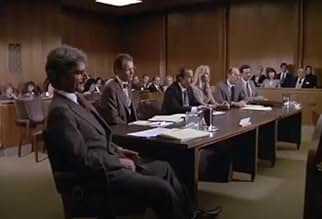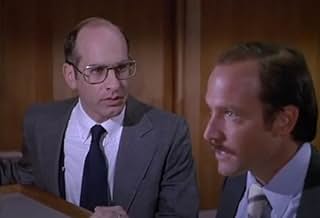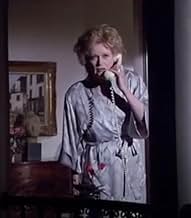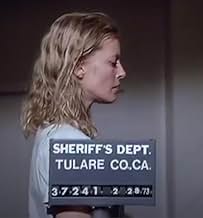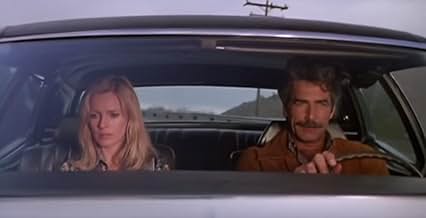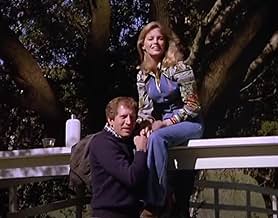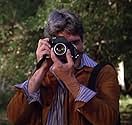अपनी भाषा में प्लॉट जोड़ेंA Beverly Hills socialite embarks on a love/hate relationship with a psychotic businessman who murdered her fiancé and then raped and terrorized her, which leads to a bizarre trial.A Beverly Hills socialite embarks on a love/hate relationship with a psychotic businessman who murdered her fiancé and then raped and terrorized her, which leads to a bizarre trial.A Beverly Hills socialite embarks on a love/hate relationship with a psychotic businessman who murdered her fiancé and then raped and terrorized her, which leads to a bizarre trial.
- 2 प्राइमटाइम एमी के लिए नामांकित
- 2 कुल नामांकन
एपिसोड ब्राउज़ करें
कहानी
क्या आपको पता है
- ट्रिवियाThe two-part miniseries was filmed entirely on location. The house interiors were filmed in Brentwood. The horse ranch was filmed in the Malibu Canyon below Mullholland. Lorimar Television's offices were located at the MGM-Sony Studio in Culver City. When Lorimar used a soundstage for any of their productions, a percentage charge would be incurred by the production paid to the studio. By not filming on the lot, this charge exempted the production. A show production office was established in an off-lot office rental facility maintained by Lorimar. The Lorimar Art Department, construction, paint, sign shop, and property departments remained on the lot unaffected by this additional rate charge.
फीचर्ड रिव्यू
I read Joan Barthel's book a long time ago. As far as I can remember it, this TV movie stick pretty close to the facts, although the facts themselves are incredible.
Sam Elliott appears as an affable and handsome photographer, Jordan Williams, who for no discernible reason murders Hope Masters' (Cheryl Ladd's) fiancé, then rapes her. He's going to kill her too, he says, but she turns out to be so passive and willing a partner that he decides to spare her. (Every reasonable man wants a beautiful young body slave, right?)
To shut her up about what's just happened, he spins a wildly improbable story about being a hit man fulfilling a contract on her and her fiancé. Should she spill the beans, he assures her, "the right people" will come and finish off both her and her kids. So she goes along with the whole cockamamy shtick. She's with him through thick and thin, trial included, as if her life depended on it, which she alone seems to believe it does. Her last words on screen: "Nobody ever wondered if the reason he let me live is because he thought I was a good person." (Something like that.)
Ordinarily, it gets sort of irritating when these true-crime stories lose track of the crime itself and get lost exploring the relationships between the people involved. But in this case, that's its most interesting feature.
Why did he do what he did? More important, why did SHE do what she did?
Actually, Elliott's character is easy to understand. He's a bona fide, old-fashioned, Class A psychopath. Everything he does is textbook perfect. He's used a million different names. He lives by his wits from moment to moment. (Why did he kill the fiancé? Because he felt like it and because he thought he could get away with it.) He's not especially bright but he can mobilize everything he knows. He's great at "scanning" people he talks to, figuring out their desires, their weaknesses, the likelihood of their falling under his spell. He knows exactly how to manage the impression he makes on others. He's a narcissist. (He writes letters from prison complaining in all seriousness about the lack of facilities, such as hair blow-dryers. In his mug shot he looks put upon, perhaps because his hair is messed up.) He signs his letters cutely, the way that appeals to high-school girls -- "Love 'n Stuff." He threatens his female victims with the loss of his affection if they don't do what he wants, but he threatens gently not nastily -- "Maybe you'd better get off the trolley, lady." He polishes his appearance. He's tall and dresses immaculately, smokes a fatherly pipe, knows what people want. The slams are full of people like him because psychopaths too have a weakness. They live in the moment and aren't very good at planning the future, so they usually make some dumb mistake and get caught.
So much for him. She's a different matter, and a more interesting one. What is the Stockholm syndrome anyway? A bank robbery in Sweden was interrupted by police. The robbers locked themselves and a couple of hostages in a vault and it took a long time to dig them out. When the robbers were finally captured and the hostages freed, it was discovered that one or two of the women had fallen in love with the criminals. One woman rushed alongside her lover's gurney, holding his hand. The scent of orange blossoms hung in the air.
It's all perfectly predictable now, for women victims anyway. As far as I know, it's never been carefully studied. Of course any social scientist can make an armchair judgment, but why do some women seem more vulnerable than others? And what traits must the criminals show? What are the conditions under which these bonds develop?
Hope Masters was a special case. She was beautiful and very rich, although for one reason or another her family had cut off her allowance. (The book makes a big point of her being "the only heiress to qualify for food stamps.) She seems to have been a pathetically inadequate dependent personality, ideally suited for the role of hostage cum willing accomplice. The Hollywood machine is exquisitely tuned to the economics of the sniffle.
There's no evidence that she'd ever met Williams before. He comes out of the blue, like a bout with acute schizophrenia. And he finds the perfect hostage in Hope Masters. It would be nice to know why such bonding takes place. But the writers don't know. (Joan Barthels seems to blame society for ignoring Hope Masters or somehow debasing her. Maybe it's that old patriarchal society we live in.) Hope Master's doesn't know either. She's much better at feeling that thinking. And Jordan Williams? If he knew, he could probably articulate it, but he doesn't know either, if only because he never gave it a thought.
Sam Elliott appears as an affable and handsome photographer, Jordan Williams, who for no discernible reason murders Hope Masters' (Cheryl Ladd's) fiancé, then rapes her. He's going to kill her too, he says, but she turns out to be so passive and willing a partner that he decides to spare her. (Every reasonable man wants a beautiful young body slave, right?)
To shut her up about what's just happened, he spins a wildly improbable story about being a hit man fulfilling a contract on her and her fiancé. Should she spill the beans, he assures her, "the right people" will come and finish off both her and her kids. So she goes along with the whole cockamamy shtick. She's with him through thick and thin, trial included, as if her life depended on it, which she alone seems to believe it does. Her last words on screen: "Nobody ever wondered if the reason he let me live is because he thought I was a good person." (Something like that.)
Ordinarily, it gets sort of irritating when these true-crime stories lose track of the crime itself and get lost exploring the relationships between the people involved. But in this case, that's its most interesting feature.
Why did he do what he did? More important, why did SHE do what she did?
Actually, Elliott's character is easy to understand. He's a bona fide, old-fashioned, Class A psychopath. Everything he does is textbook perfect. He's used a million different names. He lives by his wits from moment to moment. (Why did he kill the fiancé? Because he felt like it and because he thought he could get away with it.) He's not especially bright but he can mobilize everything he knows. He's great at "scanning" people he talks to, figuring out their desires, their weaknesses, the likelihood of their falling under his spell. He knows exactly how to manage the impression he makes on others. He's a narcissist. (He writes letters from prison complaining in all seriousness about the lack of facilities, such as hair blow-dryers. In his mug shot he looks put upon, perhaps because his hair is messed up.) He signs his letters cutely, the way that appeals to high-school girls -- "Love 'n Stuff." He threatens his female victims with the loss of his affection if they don't do what he wants, but he threatens gently not nastily -- "Maybe you'd better get off the trolley, lady." He polishes his appearance. He's tall and dresses immaculately, smokes a fatherly pipe, knows what people want. The slams are full of people like him because psychopaths too have a weakness. They live in the moment and aren't very good at planning the future, so they usually make some dumb mistake and get caught.
So much for him. She's a different matter, and a more interesting one. What is the Stockholm syndrome anyway? A bank robbery in Sweden was interrupted by police. The robbers locked themselves and a couple of hostages in a vault and it took a long time to dig them out. When the robbers were finally captured and the hostages freed, it was discovered that one or two of the women had fallen in love with the criminals. One woman rushed alongside her lover's gurney, holding his hand. The scent of orange blossoms hung in the air.
It's all perfectly predictable now, for women victims anyway. As far as I know, it's never been carefully studied. Of course any social scientist can make an armchair judgment, but why do some women seem more vulnerable than others? And what traits must the criminals show? What are the conditions under which these bonds develop?
Hope Masters was a special case. She was beautiful and very rich, although for one reason or another her family had cut off her allowance. (The book makes a big point of her being "the only heiress to qualify for food stamps.) She seems to have been a pathetically inadequate dependent personality, ideally suited for the role of hostage cum willing accomplice. The Hollywood machine is exquisitely tuned to the economics of the sniffle.
There's no evidence that she'd ever met Williams before. He comes out of the blue, like a bout with acute schizophrenia. And he finds the perfect hostage in Hope Masters. It would be nice to know why such bonding takes place. But the writers don't know. (Joan Barthels seems to blame society for ignoring Hope Masters or somehow debasing her. Maybe it's that old patriarchal society we live in.) Hope Master's doesn't know either. She's much better at feeling that thinking. And Jordan Williams? If he knew, he could probably articulate it, but he doesn't know either, if only because he never gave it a thought.
- rmax304823
- 21 मई 2004
- परमालिंक
टॉप पसंद
रेटिंग देने के लिए साइन-इन करें और वैयक्तिकृत सुझावों के लिए वॉचलिस्ट करें
- How many seasons does A Death in California have?Alexa द्वारा संचालित
विवरण
इस पेज में योगदान दें
किसी बदलाव का सुझाव दें या अनुपलब्ध कॉन्टेंट जोड़ें



